Even on the Right, Largest Share of Israelis Support Hostage Deal That Includes Full Withdrawal from Gaza
About two-thirds of the public support a deal that would include the release of all the hostages in exchange for the cessation of hostilities and the withdrawal of the IDF from all of the Gaza Strip. A majority of Jewish and Arab Israelis oppose Jewish settlement in Gaza. Around one-third of the general public think that Israeli society will be able to bear the burden of prolonged fighting for only a few more months.
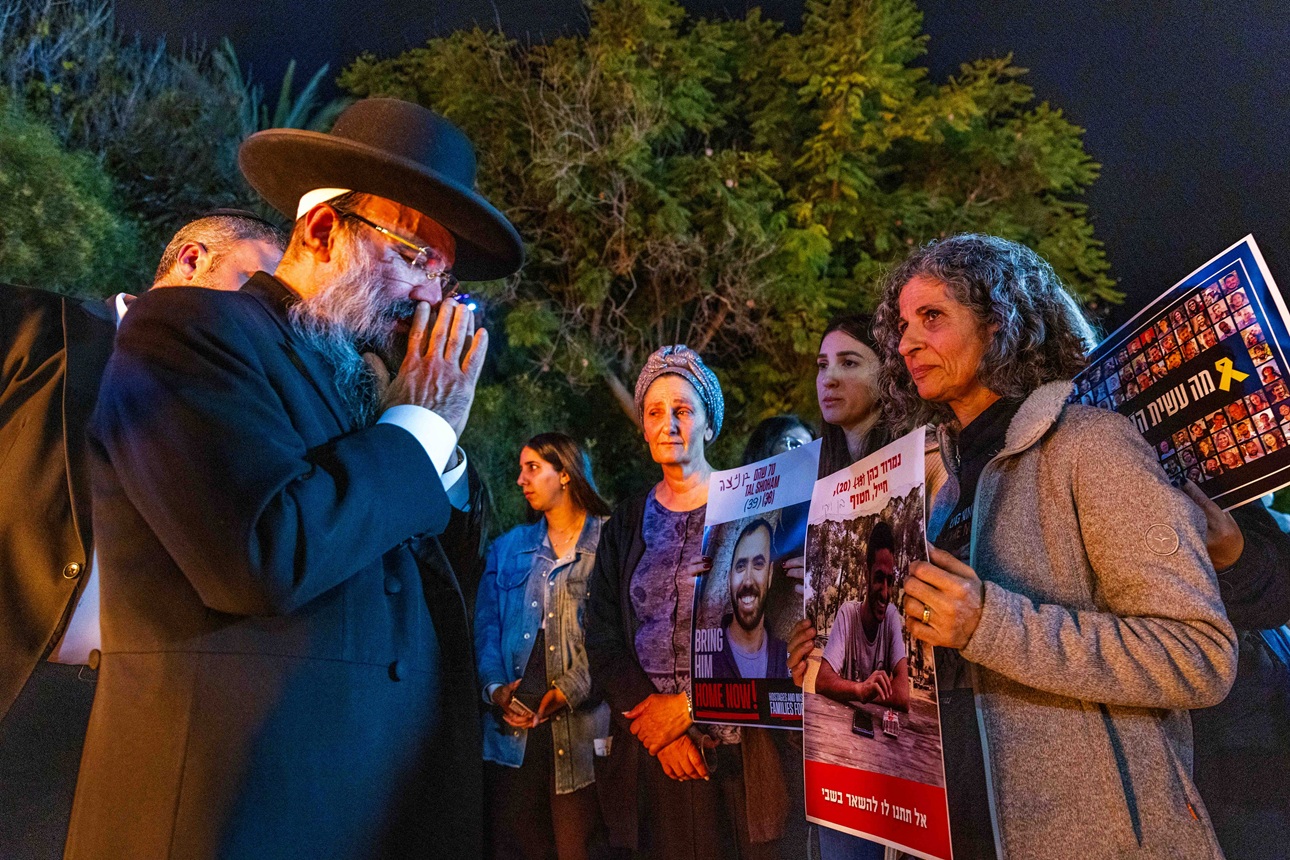
Photo by Yossi Aloni/Flash90
Methodology
The survey was conducted by the Viterbi Family Center for Public Opinion and Policy Research at the Israel Democracy Institute between August 24–28, 2025. It was based on a representative sample of the population in Israel aged 18 and above, comprising 600 Jewish interviewees and 150 Arab interviewees.
Main Findings
- We found no real changes in the national mood indicators this month, with the exception of a slight increase in optimism about the country’s economic future. Optimism about the future of social cohesion remains the lowest among the four indicators.
- Around two-thirds of the public support a deal that would include the release of all the hostages in exchange for the cessation of hostilities and the withdrawal of the IDF from all of the Gaza Strip. More than half of the voters for Likud, United Torah Judaism, and Shas support such a deal.
- In the Jewish public, more respondents support than oppose the cabinet’s decision to expand military operations in Gaza and hold on to territory there. Among Arabs, a very large majority oppose this plan.
- A majority of the general public (among both Jews and Arabs) oppose Jewish settlement in Gaza. However, on the Right (Jews), some two-thirds support it.
- Around one-third of the general public think that Israeli society will be able to bear the burden of prolonged fighting for only a few more months. Only around a quarter think it will be able to bear this burden for as long as necessary, a sharp decline from previous measurements.
- More than half of the public think that the country’s leaders are not making every effort to secure the release of the hostages. On the Right (Jews), the majority think that the leadership is doing everything possible, while those on the Left and in the Center hold the opposite view.
- Regarding the "day after", almost half of the Jewish public would prefer a multinational force to control the Gaza Strip, while around a third support Israeli control. Among Arab respondents, the preferred options are control by the Palestinian Authority or by a multinational force.
- On the fifth anniversary of the Abraham Accords, almost half of the Israeli public think that the agreements have met expectations, a significant decline compared to a corresponding measurement a year after the signing.
This month, we found no major changes in the levels of optimism about the future, excepting a slight improvement (2% in the total sample) in the share of optimists about the future of the economy. There was a small decline in optimism about the future of security (3%), though this is within the margin of error and thus should not be taken as evidence of a new trend. As in previous surveys, in three of the four indicators (security, democracy, and economy) the share of optimists is larger among Jews than among Arabs. Overall, in all four indicators and among both Jews and Arabs, less than half the public are optimistic.
Optimistic about the future of democratic rule, national security, the economy, and social cohesion (total sample; %)
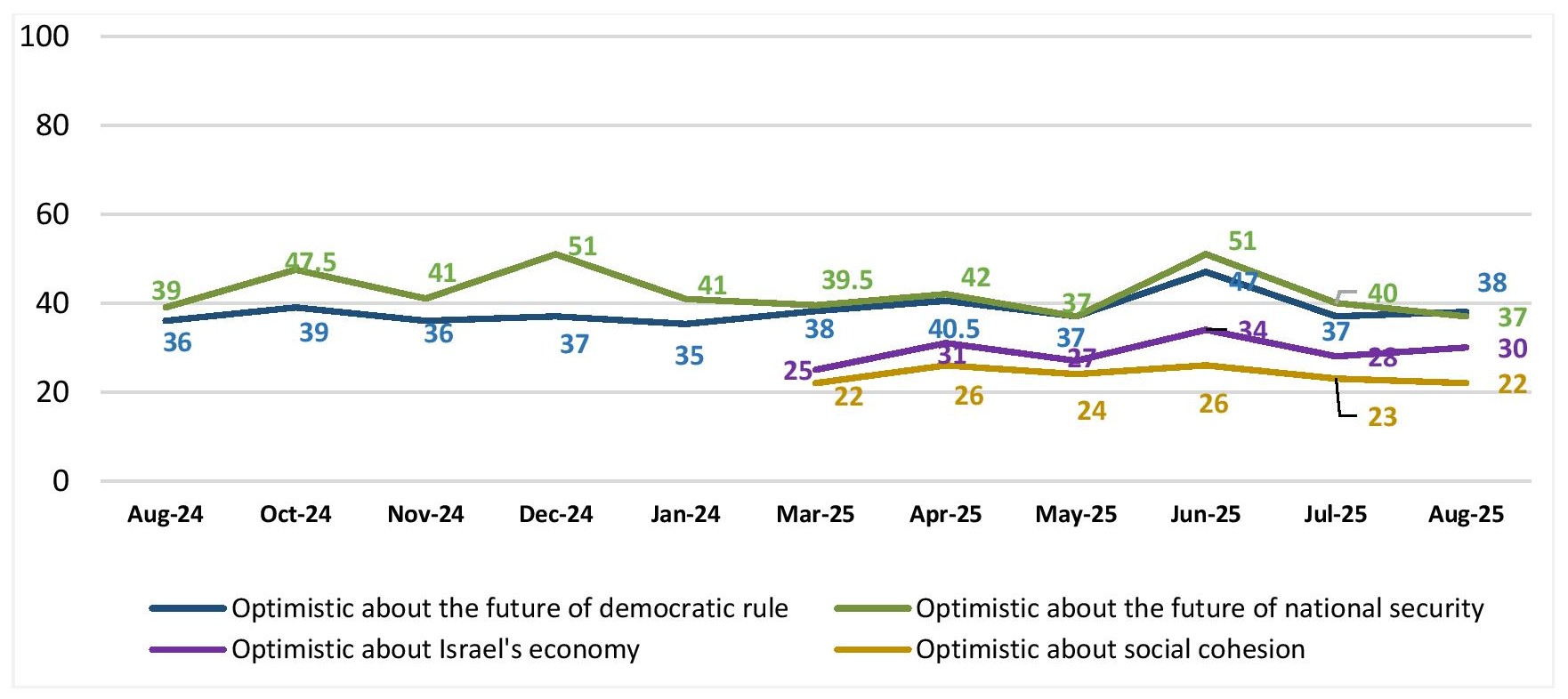
Breaking down the findings by political orientation (Jews) reveals that as in the past, the share of optimists is smallest on the Left and largest on the Right, with the Center somewhere in between. On the Right, optimists constitute the majority regarding both the future of democratic rule and the future of national security. On the Left, the level of optimism across all four indicators is very low. As in all previous measurements, optimism about the future of social cohesion is the lowest (on the Left, equal to optimism about the future of democratic rule).
Optimistic about the future (Jews, by political orientation; %)
| Future of national security | Future of democratic rule | Future of the economy | Future of social cohesion | |
| Left | 14 | 9.5 | 12 | 9.5 |
| Center | 28.5 | 27 | 21 | 15 |
| Right | 54 | 54.5 | 40 | 29 |
According to media reports, the release of all the Israeli hostages may be possible as part of a deal that includes the cessation of hostilities and the complete withdrawal of the IDF from the Gaza Strip. We asked: “In your opinion, should Israel agree to a deal on this basis?” In the total sample, a majority of around two-thirds support such a deal. Among Jews, 62% think that Israel should agree, and among Arabs, 81%.
Should Israel agree to a deal that includes the release of all the Israeli hostages, the cessation of hostilities, and the complete withdrawal of the IDF from the Gaza Strip? (total sample; %)
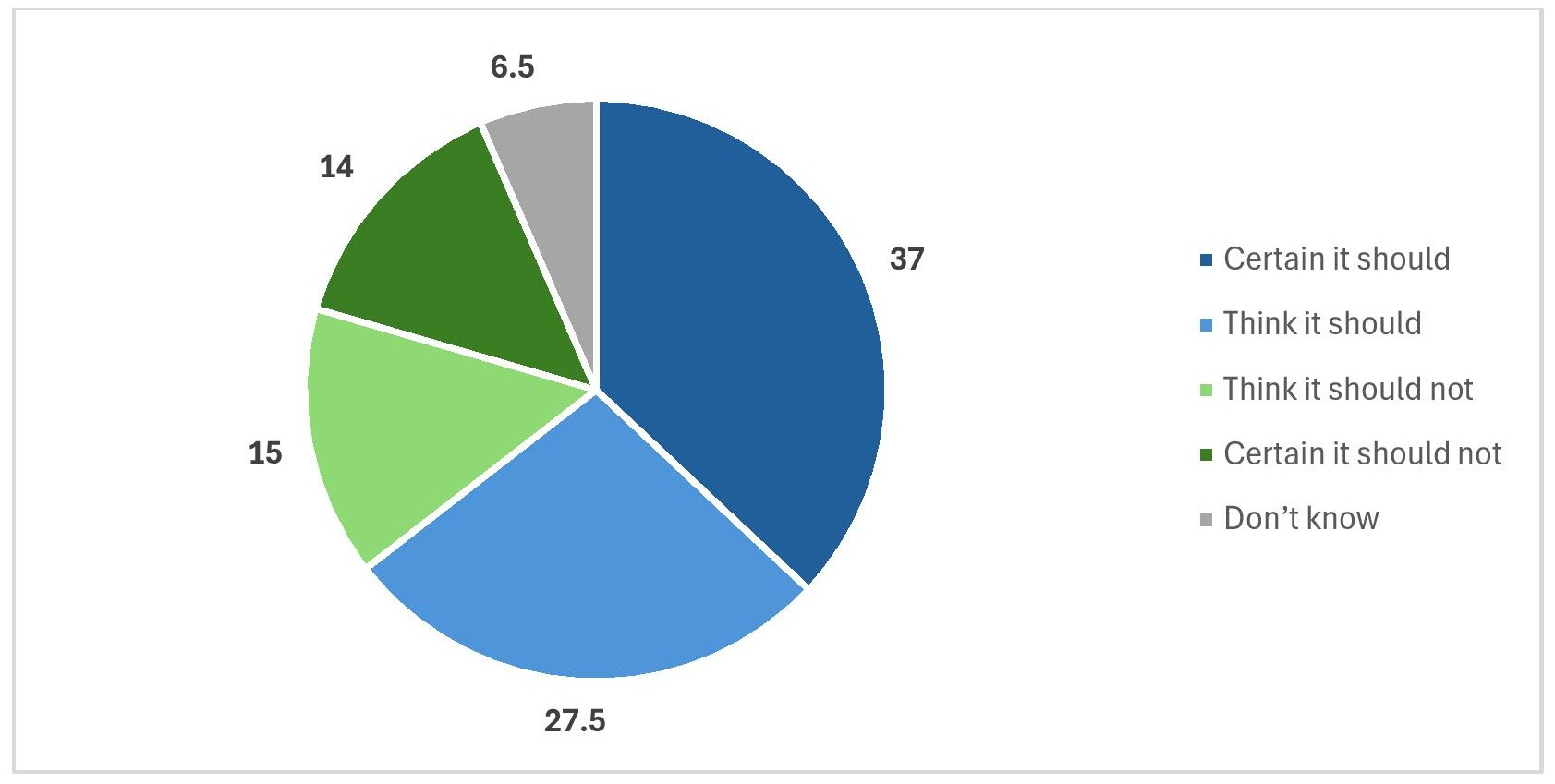
Breaking down responses in the Jewish sample by political orientation reveals an overwhelming majority on the Left (92%) and a large majority in the Center (77%) who support such a deal. The Right is divided, though the share of those in favor of such a deal is slightly larger than of those who oppose it (47% versus 44%). A breakdown by vote in the 2022 elections reveals a majority of supporters for this deal among voters for the coalition parties Likud, Shas, and United Torah Judaism. Only among Religious Zionism voters do the majority oppose such a deal. As expected, the majority of voters for opposition parties support the deal.
Think that Israel should agree to a deal that includes the release of all the Israeli hostages, the cessation of hostilities, and the complete withdrawal of the IDF from the Gaza Strip (total sample, by vote in the 2022 Knesset elections; %)
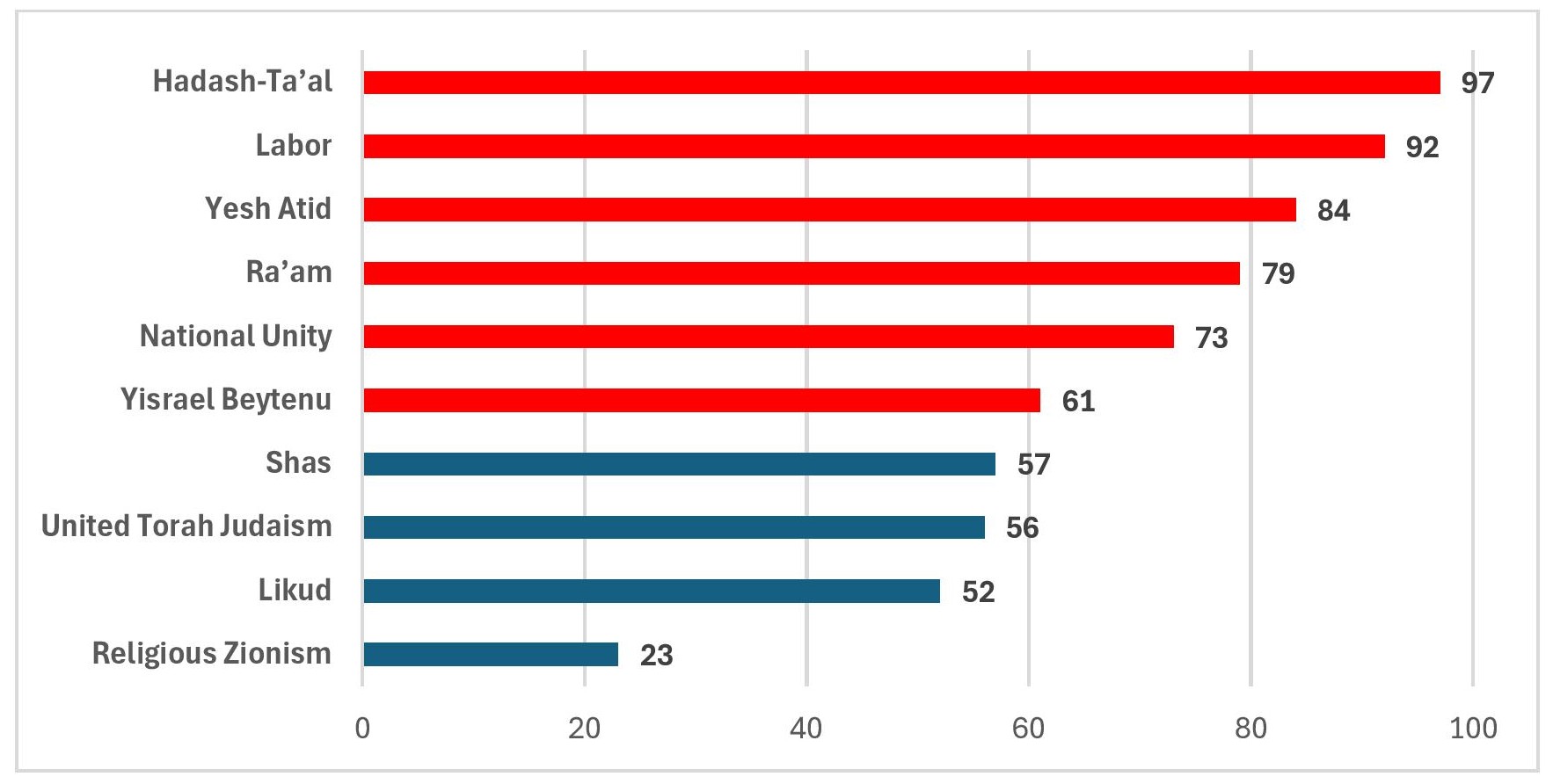
Note: Coalition parties marked in blue, opposition parties in red.
Recently, the security cabinet approved the expansion of military operations in Gaza, including taking and holding territory. We asked: “Do you support or oppose this decision?” Around half the Israeli public are opposed to the cabinet’s decision. However, in the Jewish public, support for the decision outweighs opposition to it, while among Arabs, a large majority oppose expanding military operations.
Breaking down responses in the Jewish sample by political orientation reveals that an overwhelming majority on the Left and around two-thirds of those in the Center oppose the decision to expand military operations, while on the Right, more than two-thirds support it.
Support or oppose the cabinet’s decision to expand military operations in Gaza, including taking and holding territory (%)
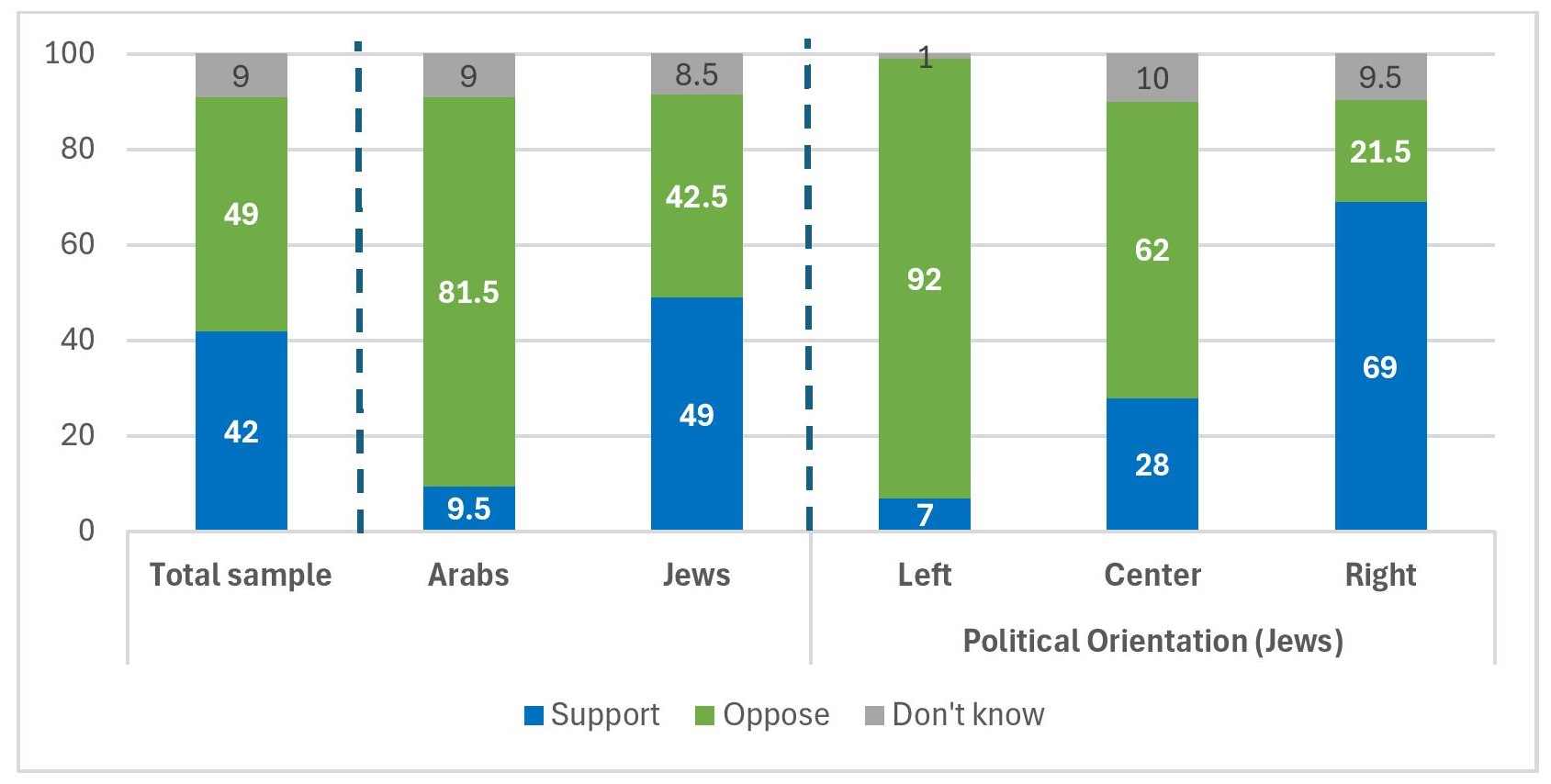
We asked: “Do you support or oppose Jewish settlement in the Gaza Strip?” More than half of Jews and almost 90% of Arabs oppose Jewish settlement in Gaza, findings that are very similar to those obtained in November 2024.
Breaking down the Jewish sample by political orientation, we found unequivocal opposition to Jewish settlement in Gaza on the Left (93%) and in the Center (77%), while on the Right, the majority (61%) support it.
Do you support or oppose Jewish settlement in the Gaza Strip? (%)
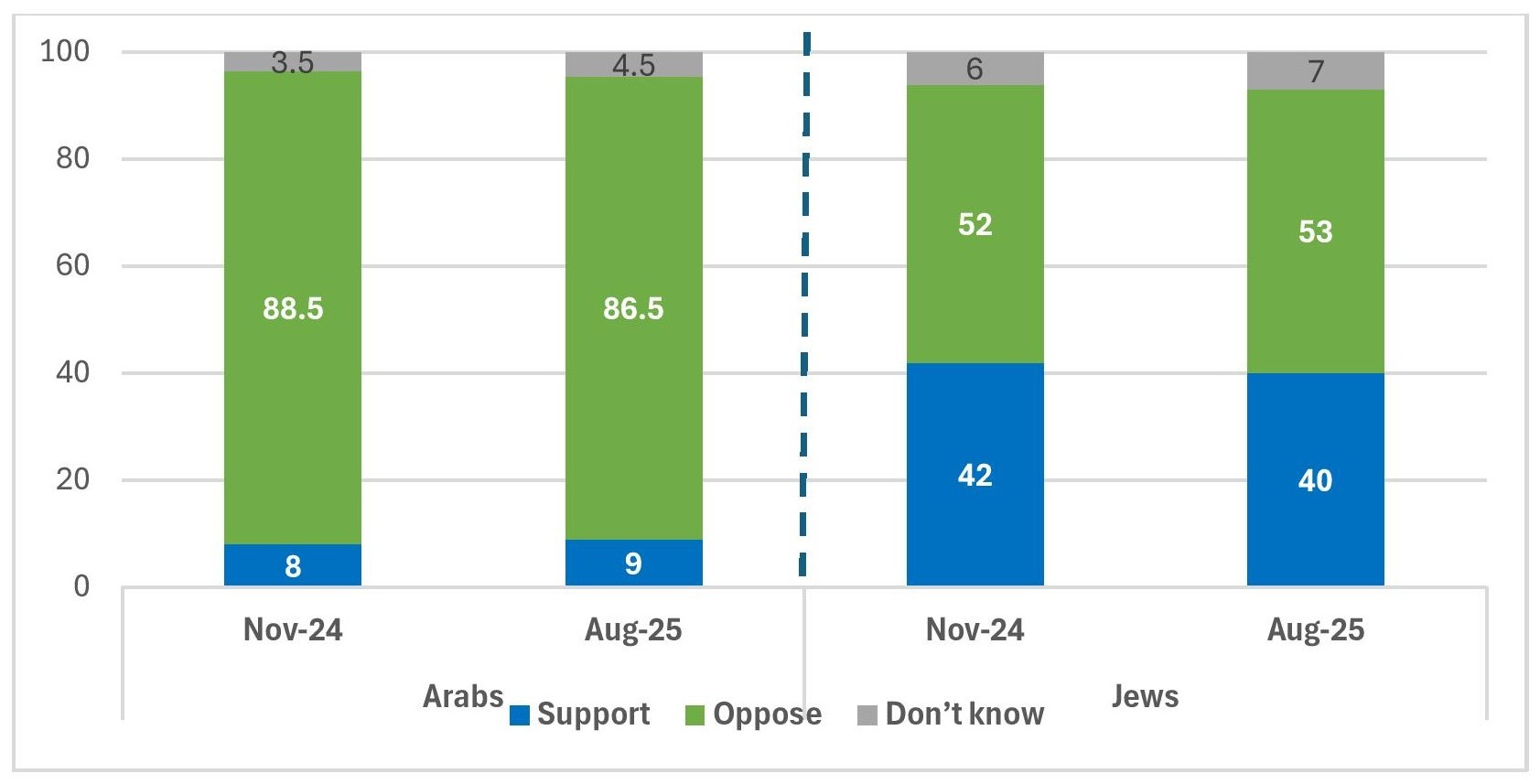
We also found a link between religiosity and support for settlement: The highest level of support was registered among the Haredim, even higher than that recorded in November 2024, while the lowest level of support was found among secular Jews. A significant decline in support was found in the traditional non-religious public, while the level of support in the national religious and traditional religious groups remained unchanged.
Support Jewish settlement in the Gaza Strip (Jews; %)
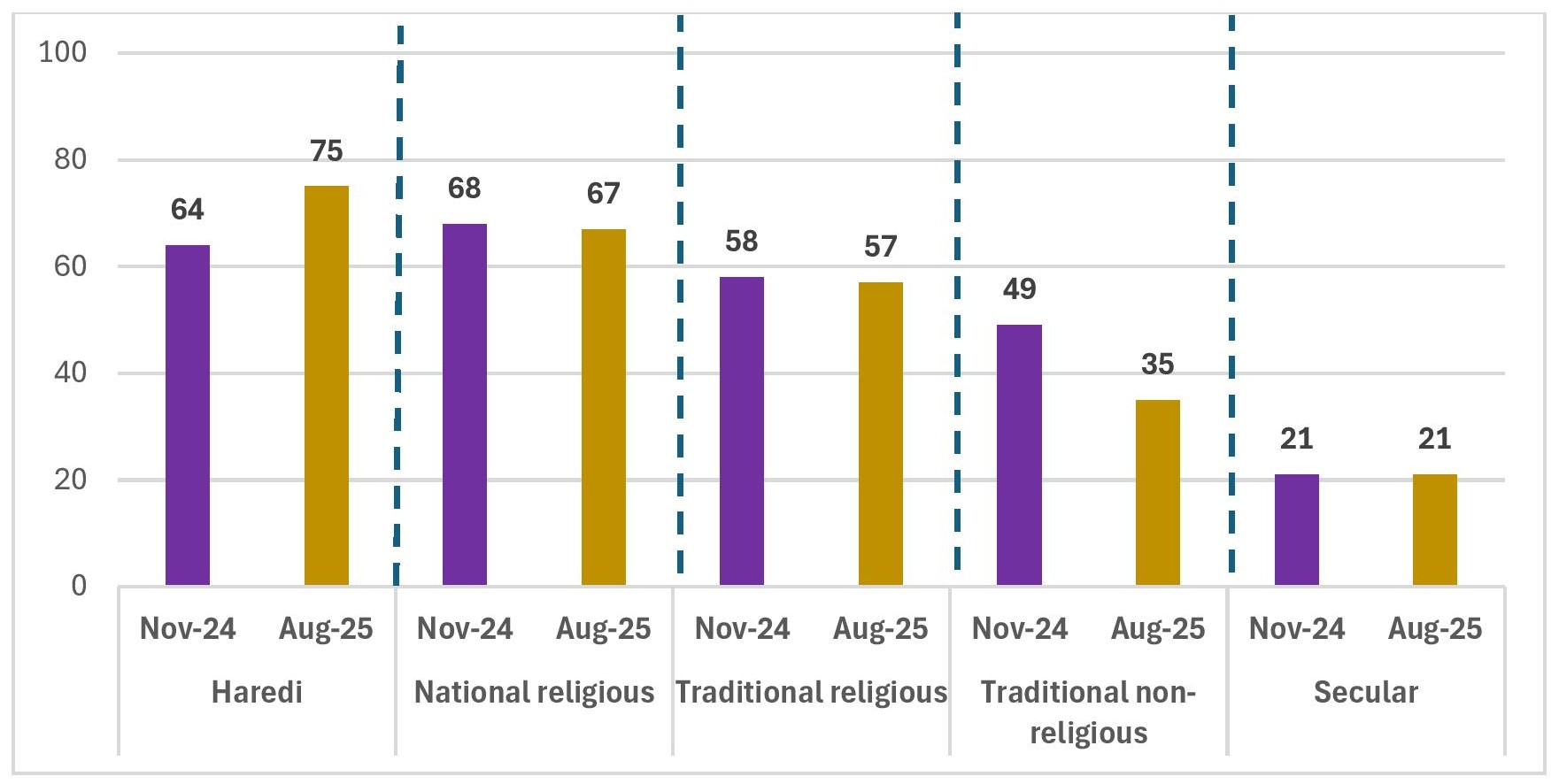
We found an association between support for Jewish settlement in the Gaza Strip and support for the deal we presented above. As expected, among those opposed to Jewish settlement in Gaza, a large majority support the deal. The surprising finding is that more than a third of those who support settlement also support a deal that includes the withdrawal of IDF forces from all of Gaza, which would rule out the possibility of Jewish settlement there for the foreseeable future. A similar picture emerges in terms of the link between support for the deal and support for the cabinet decision plan to expand military operations and to take and hold territory. Here, too, more than a third of those who support the cabinet’s decision support the deal. In other words, a significant number of those who support the expansion of the fighting and Jewish settlement in Gaza also support a deal for the return of all the abductees.
Think that Israel should agree to a deal that includes the release of all the Israeli hostages, the cessation of hostilities, and the complete withdrawal of the IDF from the Gaza Strip, by views on the cabinet decision to expand military operations and on Jewish settlement in Gaza (total sample; %)
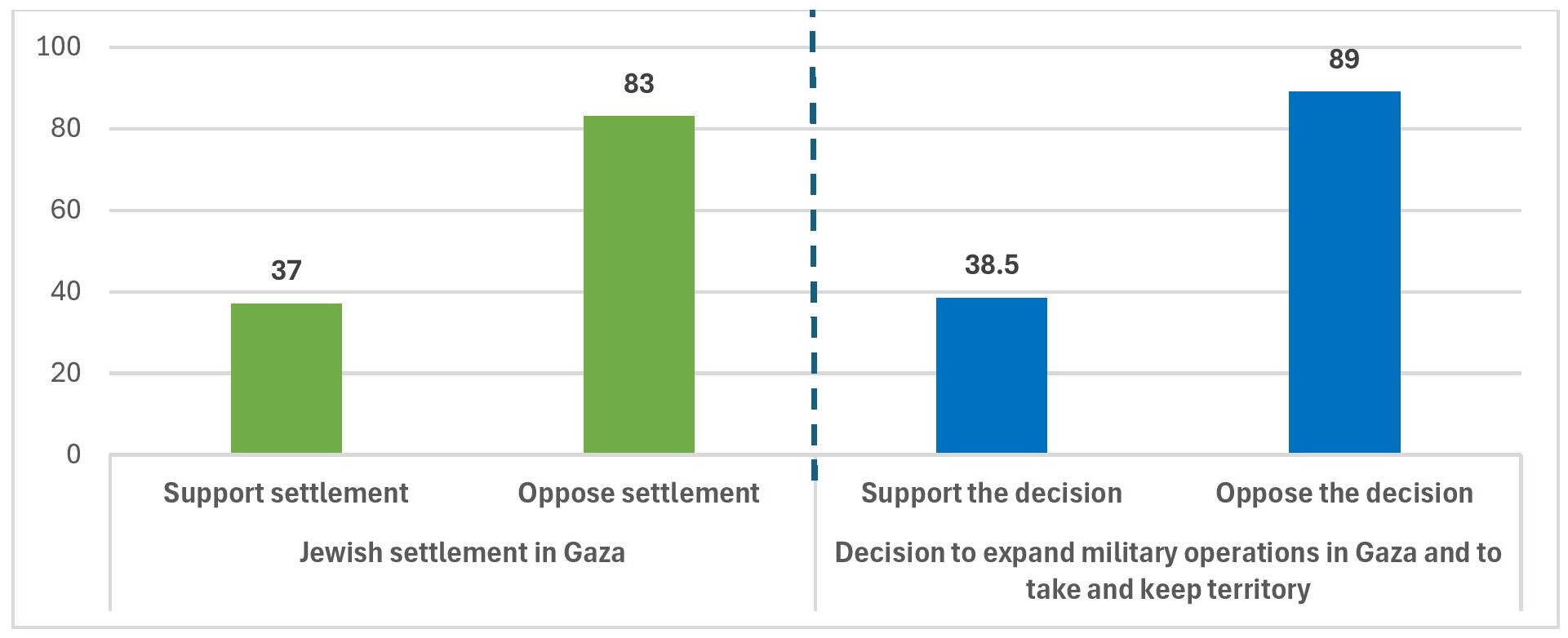
Against the backdrop of the decision to expand military operations and the implications of this decision, we asked once again (more than a year after the previous measurement): “In your opinion, how long will Israeli society be able to bear the burden of continued fighting in Gaza?” Around a third of the total sample estimate that Israeli society can endure continued fighting for no more than a few months, while around a quarter think it can bear the burden for as long as it takes to achieve the goals of the war, 16.5% believe that the most likely period is between six months and a year, and around 10% say it can last a year or more.
In the Jewish public, there is a trending decline in the share of those who think that Israeli society is capable of bearing the burden of war for as long as necessary—from almost 40% in March 2024 to 28% today. Correspondingly, there has been a similar increase in the proportion of those who believe that Israeli society can bear just a few more months. Among Arab respondents, there has been a sharp decline in the share of those who think that Israeli society’s capacity for endurance is somewhere between a few months and a year (from 69% in March 2024 to 50% today), and a similar rise in the share who opt for the “don’t know” response (from 12% then to around a third now).
How much longer can Israeli society bear the burden of continued fighting? (%)
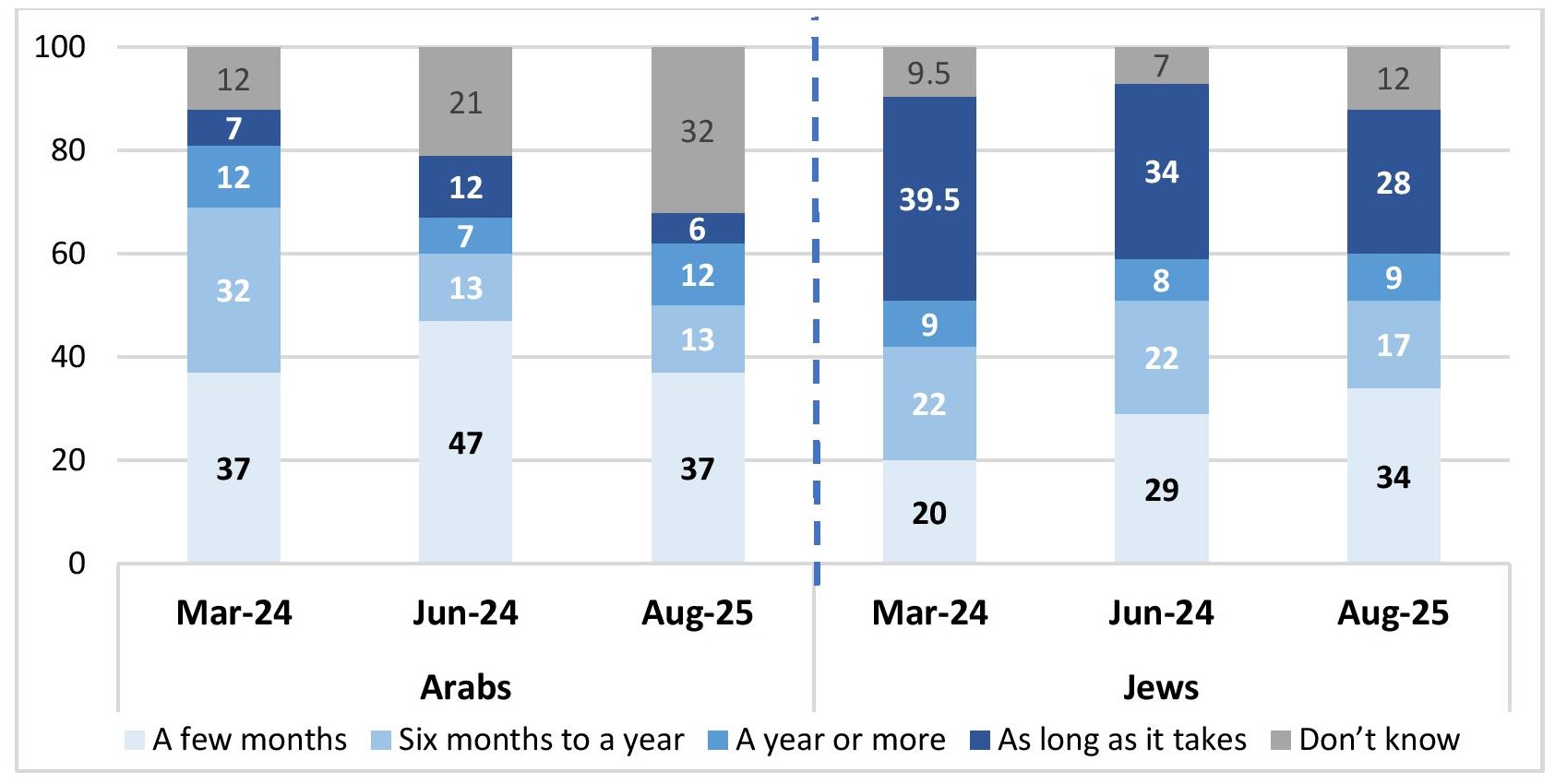
In all three political camps (Jews), we found a decline in the share of respondents who think that Israeli society can bear the burden of the war for as long as it takes (Left, from 23.5% in March 2024 to 6% today; Center, from 27% to 16.5%; Right, from 47% to 39%).
We examined the relation between assessments of Israeli society’s capacity to endure prolonged fighting and support for the cabinet’s decision to expand military operations in Gaza. We found significant differences among those holding views at the end of the spectrum: Almost three-quarters of those who believe that Israeli society can bear the burden for just a few months oppose the expansion of the fighting. Meanwhile, a similar proportion among those who believe that Israeli society can endure for long as it takes to achieve its war goals support the cabinet decision.
Support the cabinet’s decision to expand military operations in the Gaza Strip and take and hold territory there, by assessment of Israeli society’s ability to bear the burden of continued fighting (total sample; %)
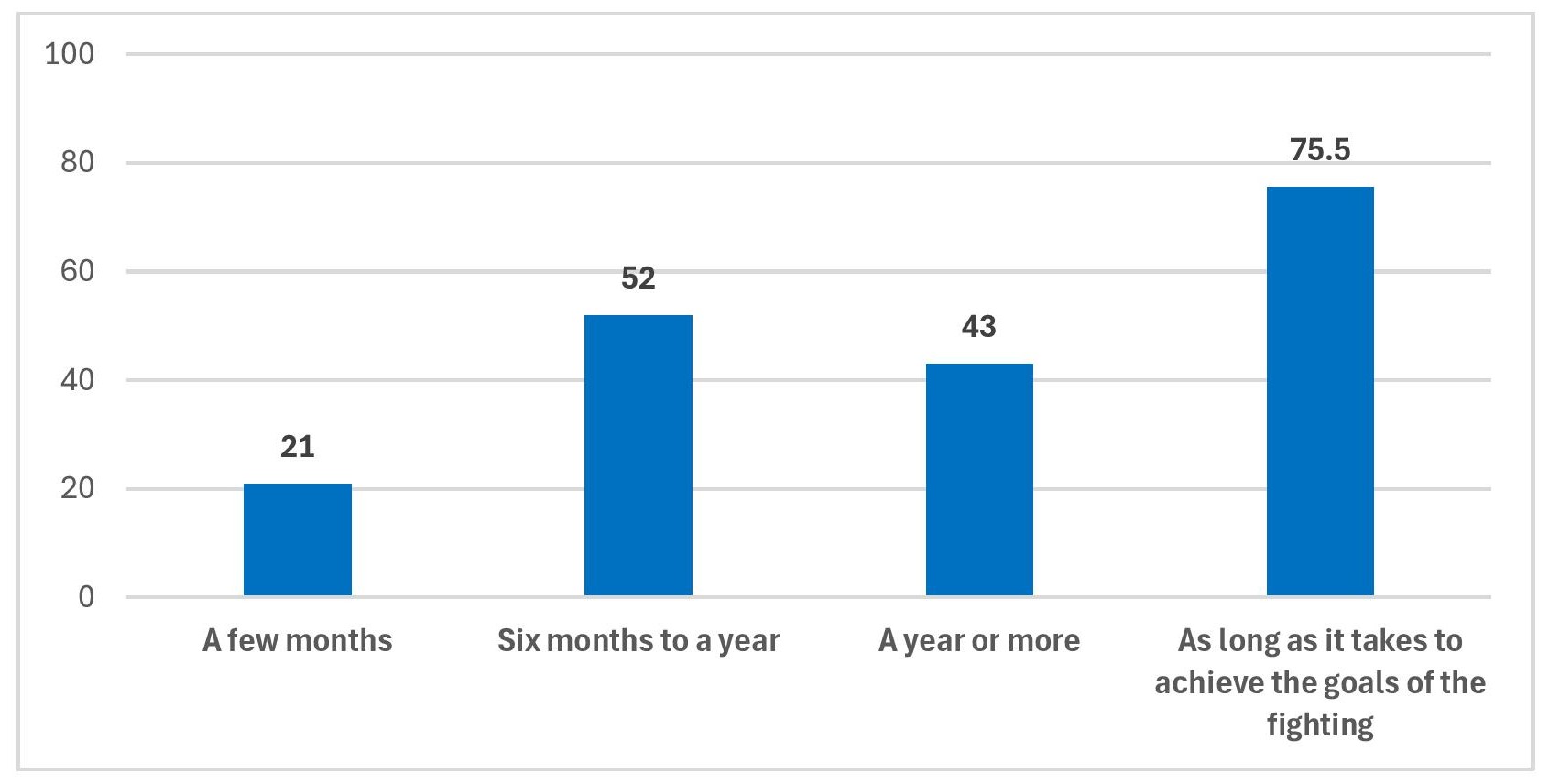
The distribution of responses to this question is similar to those we obtained in March and November 2024: More than half of the Israeli public (53%) think that the leadership is not making every effort to secure the release of the hostages (Jews, 51.5%; Arabs, 63%). A breakdown by political orientation (Jews) shows that on the Right, as in the past, around two-thirds think that the leadership is indeed doing everything it can. By contrast, this view is held by only a minority in the Center and a tiny minority on the Left.
Think or are certain that Israel’s leadership is making every effort to secure the release of the hostages (%)
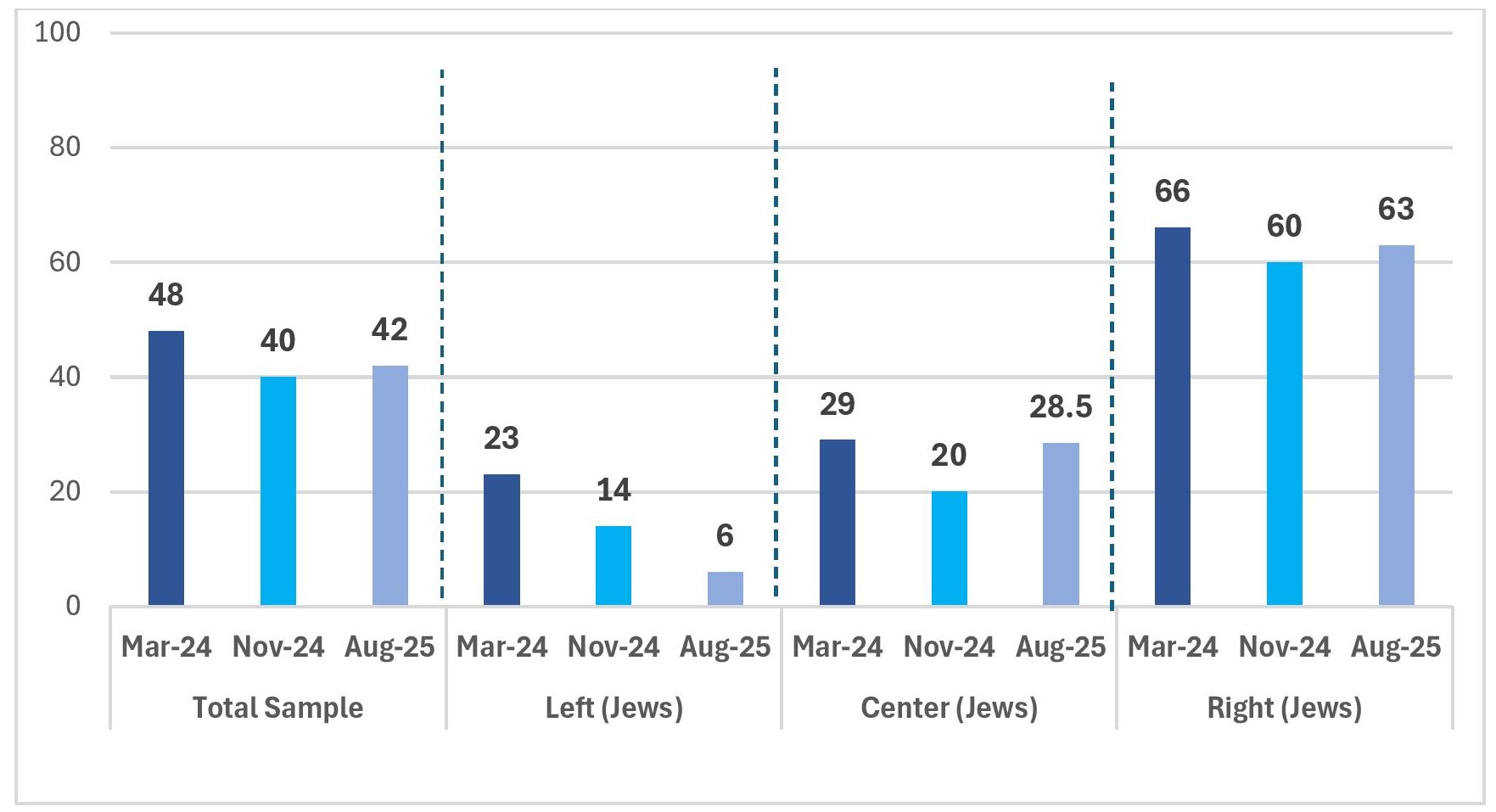
Similar to previous measurements, in September 2024 and January 2025, the largest share of Jewish respondents would prefer that after the war is over, a multinational force controls Gaza. In second place, as in the previous measurements, just over a third prefer Israeli control of the Strip. Only a small minority would prefer control to be handed to the Palestinian Authority or to Egypt (an option we added only in the current measurement).
In the Arab public, the preferred options are the Palestinian Authority or a multinational force, followed by Egyptian control. Around one-tenth prefer control by a weakened Hamas, a significant decrease from the previous measurement, which has turned out to be an outlier compared to the other measurements. Once again, Israeli control is ranked last. It is worth noting the large proportion of Arab respondents who chose the “don’t know” option, essentially constituting the largest share of the Arab sample.
In your opinion, who should control the Gaza Strip after the end of the war? (%)
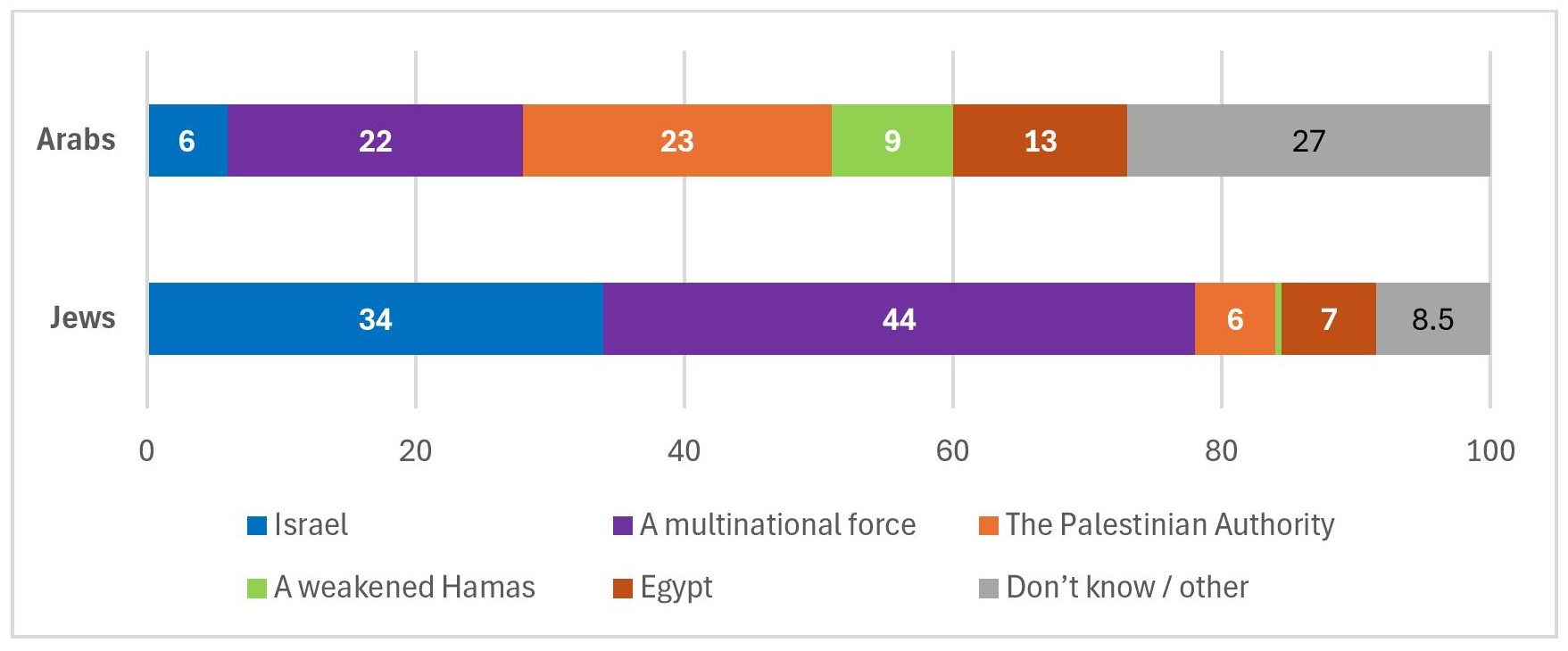
A breakdown by political orientation (Jews) reveals a preference on the Left for control by a multinational force (55%), followed by the Palestinian Authority (25%). In the Center, the preferred option is for a multinational force to control Gaza (56%), followed by Israel (18%), while on the Right, the preferred option is Israeli control (48.5%), followed by a multinational force (35%).
Five years ago, Israel signed the Abraham Accords with the United Arab Emirates and Bahrain. This month, we asked the same question we posed to our respondents a year after the accords were signed: “In your opinion, have the agreements met the expectations for them?” Overall, 45% think that the Abraham Accords have fulfilled expectations, while 28% think the opposite. A large share of 27% say they don’t know.
Among Jews, there has been a significant decline in the proportion who think that the agreements have met expectations, along with a significant increase in the proportion who hold the opposite view. Among Arabs, there has been a fall in the share who think that the agreements have not met expectations; however, this was accompanied not by a rise in the share who think that expectations have been met, but rather by a rise in the share who say they don’t know.
In your opinion, have the Abraham Accords met the expectations for them? (%)
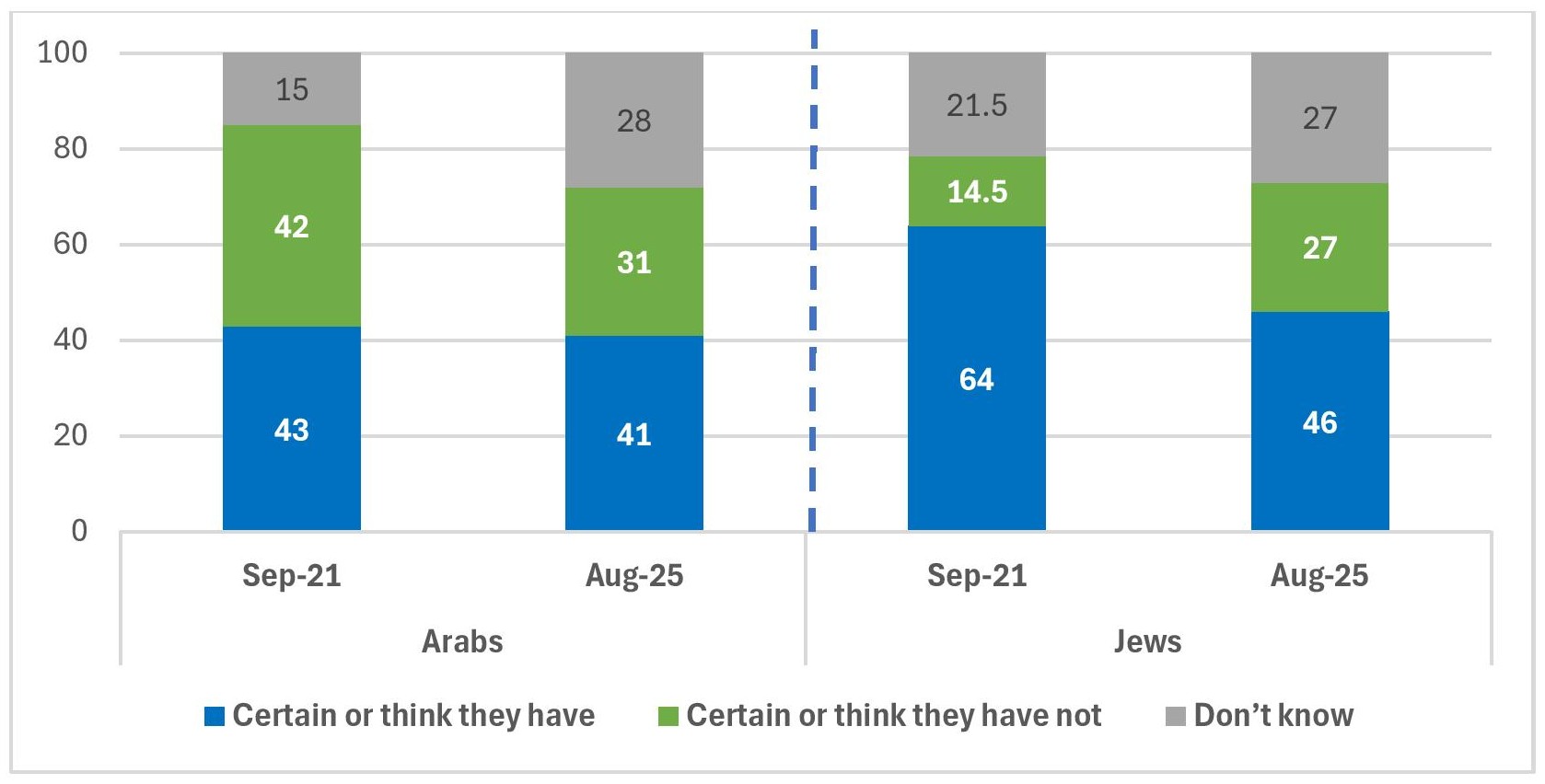
The August 2025 Israeli Voice Index was prepared by the Viterbi Family Center for Public Opinion and Policy Research at the Israel Democracy Institute. The survey was conducted via the internet and by telephone (to include groups that are under-represented on the internet) between August 24–28, 2025, with 600 men and women interviewed in Hebrew and 150 in Arabic, constituting a nationally representative sample of the adult population in Israel aged 18 and over. The maximum sampling error was ±3.58% at a confidence level of 95%. Field work was carried out by Shiluv I2R. The full data file can be found at: https://dataisrael.idi.org.il.
